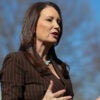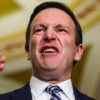Lawmakers should take the approach of a “constitutional realist” to the Russia-Ukraine war as well as foreign policy more broadly, Sen. Mike Lee, R-Utah, said Wednesday.
Lee pointed out that the United States funds about 70% of war-related assistance to Ukraine, while other NATO allies still aren’t stepping up. Under that treaty, member countries technically are obliged to devote 2% of their gross domestic product to defense spending.
“It’s high time that we put the burden of European security back on the shoulders of leaders in Brussels and London, rather than in Washington,” Lee said in a speech at The American Conservative magazine’s 10th annual Foreign Policy Conference.
The Daily Signal depends on the support of readers like you. Donate now
“Until European capitals exceed 2% of GDP spent on defense, and I would add until those same leaders also devote comparable shares of their GDP to the same conflict, the United States should not spend one penny more on Ukraine,” Lee said. “They’re making it all of our burden, even though it’s in their backyard, not ours. This isn’t fair, especially when we’ve been bearing this burden for them for decades.”
The American Conservative magazine was founded in 2002 as a voice on the Right opposed to the Iraq War, at a time when most conservative commentators supported President George W. Bush’s national security policies after the 9/11 terrorist attacks.
Lee stressed in his remarks that he understood the concerns about assisting Ukraine after the Russian invasion 15 months ago:
The theory is that if Ukraine were to fall, then all of a sudden you’ve got all these other NATO allies that we have, neighbors of Ukraine, that would end up being threatened and that could trigger or veto Article V obligations and lead to all sorts of suffering and lead to a frightening empowerment of the evil megalomaniac that is [Russian President] Vladimir Putin. I totally get that. But we have to remember something. Our European NATO allies have for decades, decade after decade, shirked their responsibility to prioritize their own defense.
The investment from the United States frees European governments to spend on domestic priorities, Lee noted.
“As my wife puts it, ‘It’s as though we’ve been funding Western European or European socialism through our defense spending,’” Lee said.
The Utah Republican also said the U.S. must consider the possible endpoint in Ukraine if matters escalate.
“Russia, we have to remember, it is not some trifling power. Scary, yes. Headed by a crazy guy, yes,” Lee said, adding:
But Russia, we have to remember, possesses nuclear weapons. A lot of nuclear weapons. More than that, Russia does not appear to be backing down. … I don’t think it’s overstating to say that a standoff with a nuclear power, particularly this nuclear power, requires a considerable amount of prudence and judgment, not peacocking and popping off.
A “constitutional realist” view of foreign policy isn’t a “neocon” worldview that favors American interventionism, Lee said, nor is it a liberal internationalist view that supports global entities such as the United Nations making decisions for sovereign nations. He also said this view isn’t an isolationist one, in which Americans want to shrug off international matters.
“I consider myself, one, to see foreign policy first through the lens of our constitutional duty, and second, we undertake that first test with the supervision of the world informed by history, especially our own history,” Lee said. “We see the answer to this question as one that can be answered only with a measure of fact-based assessment of the national interest while respecting the clearly defined roles of both Congress and the presidency in the context of American foreign policy.”
The Utah senator argued that funding and arming Ukraine against Russia isn’t happening in a vacuum, noting the increasing aggression from China.
“Our own national defense strategies in 2018 and 2020 flatly stated that the U.S. cannot engage in two major wars simultaneously,” Lee said. “Yet we are depleting our stockpiles to support Ukraine, including stockpiles of a number of things that would be needed in both arenas should that other conflict become a hot point.”
Have an opinion about this article? To sound off, please email letters@DailySignal.com, and we’ll consider publishing your edited remarks in our regular “We Hear You” feature. Remember to include the URL or headline of the article plus your name and town and/or state.
































